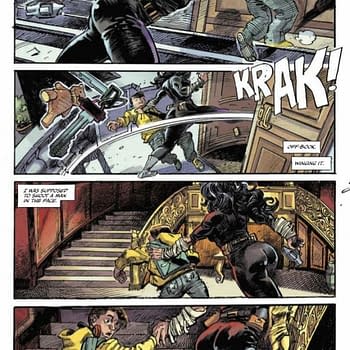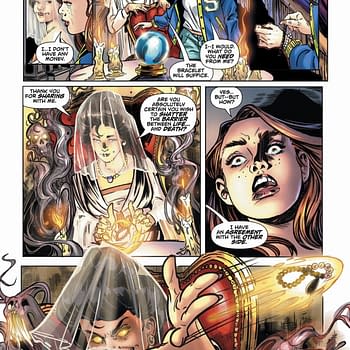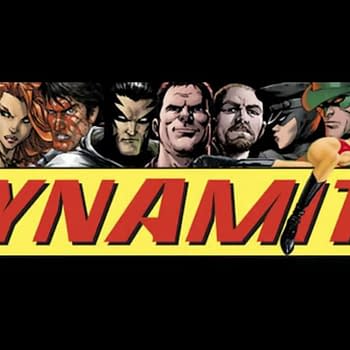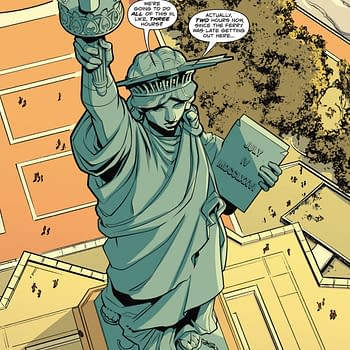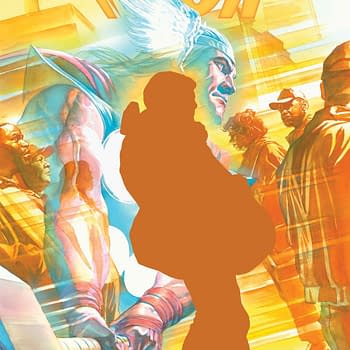Posted in: Comics, Recent Updates | Tagged: avatar press, Comics, entertainment, kieron gillen, mercury heat
Outrunning The Dawn – Kieron Gillen Talks His FCBD Book Mercury Heat
Bleeding Cool's Tom Huxley gathered the following words from the inscrutable Kieron Gillen on the subject of his soon to be released comic from Avatar Press, Mercury Heat. This space cop story comic set on an extremely hot planet arrives in full form in July, but today, May 2nd, you're able to pick up a special edition of the comic for free ahead of its release.

Tom W. Huxley: Tell me about Mercury Heat.
KG: Mercury Heat! It's a cop programme, hence, "heat". It works on multiple levels, because Mercury is a hot place. The heat is a name for the place. And also everyone's very attractive in the programme, so we get it like that. It's weird I keep calling it a programme; of course it's a comic, but it's got a weird kind of vibe like that I guess?
TWH: Like a 70s cop show.
KG: I wouldn't really say that. It's like a 70s 2000AD. I mean, it's harder science fiction than most of 2000AD. Especially that period.
Our lead character Louisa, who is a cop, she always wanted to be a cop, but she can't be one on Earth due to her personality problems. Conversely, Mercury is a bit of a wilder place.
TWH: Oh, the planet, Mercury! I was thinking a town, like Veronica Mars, Neptune.
KG: You know, I've never watched an episode of Veronica Mars, and I worked for years under the illusion that it was a science-fiction programme, because it was called f*cking Veronica Mars!
TWH: Haha. It's set in a town called Neptune.
KG: Yeah? Jeez, what the f*ck were they thinking? They say it's got good writing, I don't think so! (laughs) Ed Brubaker's a mate of mine, he's an enormous fan. So he raves about it to me, but I never got round to watching it, it just came at the wrong time in my life.
TWH: You could always watch it on DVD… after you've finished Mercury Heat.
KG: Yes… Mercury Heat. It's set some time in the future. And Earth, having battled through its environmental problems, is close to a paradise. The way they pay for this paradise is, essentially, Mercury has an enormous belt of solar panels around it, and they ship energy back to Earth, which is how Earth solves its energy problems.
TWH: Another way of dealing with Russia then! Bypass Russia, go straight to Mercury.
KG: Yes! It's kind of weird, I conceived of the book when Obama was first coming in. I thought, as much as I love a good apocalyptic movie as the next guy, apocalypse movies are almost a symptom of capitalist realism, in that the only way we conceive of a life other than the way we are living is for it to all come crumbling down, and we kind of almost hope for that. The idea of an apocalypse, from zombie apocalypse onwards, is the idea of just throwing your hands up in the air, going 'oh I don't know what to do', giving up on the idea of the future, which is just capitalist realism.
So I wanted, certainly not a utopian future, I wanted to create a future where clearly a lot of our problems have been solved, and then we've got a whole load of different problems because frankly my reading of humans is a bit more depressing.
Anyway the idea of imagining the world in a different way than it is, was the appeal. So it was kind of quasi-Obama optimistic, except not-very-optimistic, future. The not-very-optimistic future is probably the most important part of it, as I look at the past few years.

KG: No, it's just a future. They think the Earth's pretty good, it's pretty nice, there's enormous problems there. But they're very different problems from what we have. It's the classic teachings of shocking science fiction: extrapolations of problems that exist in our world, or possible ways of pushing the ways we go in our world.
How much do you know about Mercury?
TWH: The first planet from the Sun? That's about all I know.
KG: That's true, at least in part. The side that's nearest the Sun is hot enough to melt lead. However, the side that's facing away is cold. In the depths of the pits at its poles, it's virtually cold enough to liquify oxygen. One of the reasons for this is Mercury's unusual orbit and rotation. It rotates incredibly slowly. A day on Mercury is just shy of 59 days long. However the time it takes to go around the Sun is incredibly fast – 88 days. Between the two interacting, the length of a day as we would experience it on Earth (the Sun reaching the same point in the sky) is 176 days. There's an interesting side effect of this – for about three days around the Sunrise and sunset, the temperature on the surface is Earth-like. Cold on the first day and hot on the third, but within vague Earth temperature boundaries. Now, here's a third thing. Mercury is tiny. Its diameter is about a third of Earth's, only 15,329km. That means, at the equator, it's only rotating at 3.6km/h. In other words, walking If I dropped you facing the dawn on Mercury, you could stay ahead of the dawn. As long as you can keep moving.
TWH: So where on Earth did that come from?
KG: Where did it come from? I was working on Uber, with William [Christensen, publisher of Avatar Press], at the time. And Uber is so much hard work, even then, it was so much research, he was sort of, shall we do another book, something a bit more fun? He said the only guidance here is I'd quite like to do a book with a female lead. Which was easy, because I like writing female leads.
I was trying to play tonally with the concept of Cyberpunk, and all this other stuff, and it sorted of ended up in here.
And partly I think it might have just been because I hated Sunshine? (laughs) It could have been that simple!
TWH: The film? Not sunshine in general…
KG: Dude, I'm a goth. Look at me. Of course I hate sunshine, I'm a comic book writer, I listen to the Sisters of Mercy, I despise the sunshine.
So yeah, I just started playing with the maths. It's a very 2000AD world, so around it there's 44 citadels built, and basically the population is migrating around as they all work making these solar panels. The whole population migrates around 44 identical citadels on the planet. Which are all connected to a larger grid.
TWH: So they rotate around Mercury?
KG: No, the citadels are built onto the surface.
TWH: So they're hot half the time, and cold…?
KG: Yeah. They're abandoned every second day. You move from one citadel to the next around it. So basically you have 44 homes you live in. The burn hopping just keeps you moving around. And they're mostly abandoned for most of the year. And the year is only 88 days.
Actually, somebody else did a Mercury-based thing, which I only found out about after writing Mercury Heat, and their solution was cities on wheels going round, but I quite liked the complete ridiculous capitalist over the top, having 44 identical castles.
TWH: So you've got the same stuff in all of them?
KG: Yeah, the same design so… no one's in it most of the year.

KG: No, probably not that much. I mean, you'd get small rooms and you'd move stuff around. And there's other ideas, like how everyone's a freelancer. Grapevine is the big A.I. system that basically, you plug in, and you say 'I'm looking for this sort of work', and it goes 'okay', so the whole place runs like Uber, the actual taxi company [as opposed to Gillen's Avatar book of the same name]. Of course, I stress, I came up with this before Uber happened. Which is weird!
So you see what job you're f*cking looking for, and they give you what's available, so no one has any career stability ever. Full stop. Which might seem familiar.
In the first issue, Louisa writes on her thing, "Okay, get some, alright! Looking for police work", Grapevine would go, "Work available for you includes: minor construction work, food delivery."
"No no no no no, put a stop to that, is there any police work?"
"No."
"Cut my rates by 10%."
"I'm sorry Louisa, there is no police work."
"By 20%."
"Congratulations, Louisa! There is some police work available for you,"
And that's the whole idea of that awful market forces-ness of her. My different way of handling police budgets.
No one has real skills, basically all the skills are on quantum, so everyone just plugs in their stuff for the job they're required to do.
TWH: Does this extend to the police service as well?
KG: Yes. So if her boss has been the boss for the last 103 days, her job's pretty secure, she's clearly the best person for the job, but if somebody slightly better arrives, you know, "no, no, we'll hire that person instead."
TWH: So that's a real…
KG: Zero hours contract. It's all like an abstract liquidity, and it involves how this fucks people in interesting ways.
TWH: It's John Redwood's version of a jobs market.
KG: Yeah. Trust me, it's fucked up. And the other side, skills aren't actually acquired any more. Most people that acquire skills, they kind of imprint skills for a variety of purposes, which is a very odd type of idea, but I quite like it.
It's post-skill work as well, so it's essentially all about acquired privilege and who has access to this kind of technology. This side of society wins off personality types, because everybody has personality tests all the time, based upon all their browsing history for example, full stop. And the computer calculates what your personality type is based around everything you've done, and that decides so much about what kind of jobs you're going to be able to get. Louisa has an obscure personality type that makes it very hard for her to get jobs; it's not necessarily dangerous, it's just, some people are awkward.
So it's that kind of stuff. It's very 2000AD, broad, satirical, lot of room to play with stuff.
TWH: So is that an ongoing series?
KG: Yeah, that's ongoing. I've known the first three arcs, which might be all I get, and I might stop then, but the fact that it's a 2000AD sort of character means that it's a setting, it's a lead…
TWH: It's not a confined story.
KG: Yeah. I mean, I think it'll be, up to 18. The first six issue arc is almost a classic noir story but with a lot more hyper-violence. The second one is basically described as a zombie movie, and the third is a disaster movie. It's big and it's exciting and it should be, I'm looking forward to it enormously because it's a really broad satirical sort of thing and punchy.
The Mercury Heat Free Comic Book Day issue is out today, May 2nd, in shops. The series Mercury Heat #1 arrives on July 29th. Avatar Press is the parent company of Bleeding Cool.
You can follow Tom Huxley on Twitter @tomdaylight.










